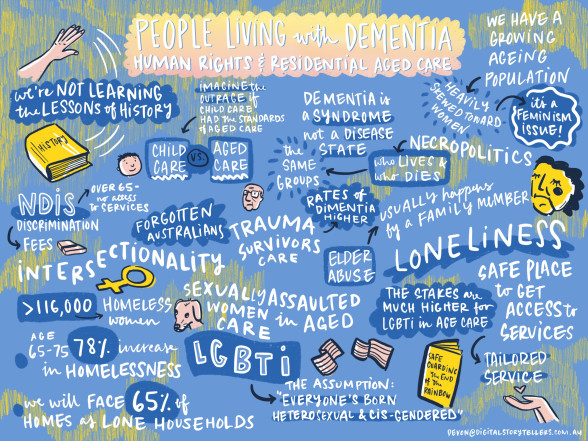In this time of COVID-19, when everyone is being asked to keep a distance from each other, and to remain isolated, some groups in our community who already experience social isolation and confinement. This especially includes older people, and those living in nursing homes (residential aged care), as those providing care being encouraged to become more risk averse, benevolent and paternalistic in their approaches to 'care'.
Different countries seem to have approached the safety and welfare of vulnerable groups in varying ways. For example. in the UK, we have heard anecdotal evidence from colleagues and members that doctors are prioritising the health - and lives - of younger people over older people, and we have heard of many deaths of older people in the UK because of this inhumane approach. In Australia, care providers were advised the following: "We got a sector email yesterday to providers to say that keeping disabled ppl locked up wasn't environmental restraint if it was for ‘therapeutic’ purposes and on medical advice. "
In part due to these types of responses to the Coronavirus pandemic, DAI Chair, Kate Swaffer felt it timely to report on the current outcomes of a research project she was involved in at the University of Technology Sydney and the University of Wollongong.
The project is called ‘Safe and Just Futures of People Living with Dementia in Residential Aged Care’.
The aims of the project were to explore:
- current barriers to liberty and community access for people living with dementia in RACFs; and
- the possibilities and challenges of utilising a human rights framework to transform the living and support arrangements of people living with dementia in RACFs.
The three project outcomes of the project so far include a published article (open access online), an anthology and the project report, as attached below.
Journal Article* - Questioning Segregation of People Living with Dementia in Australia: An International Human Rights Approach to Care Homes (2019)
Authors: Linda Steele, Kate Swaffer, Lyn Phillipson and Richard Fleming
Anthology - Human Rights for People Living with Dementia: An Australian Anthology (2020)
Edited by Linda Steele, Kate Swaffer, Lyn Phillipson and Richard Fleming
Project Report - Safe and Just Futures for People Living with Dementia in Residential Aged Care (2020)
Safe and Just Futures was funded by a Dementia Australia Research Foundation Victoria Project Grant, with additional funding support from Law Health Justice Research Centre, University of Technology Sydney.
The research team was led by Dr Linda Steele (UTS), with associate investigators: Kate Swaffer (DAI, UOW and UniSA), A/Prof Lyn Phillipson (UOW), Professor Richard Fleming (UOW), and , and research assistant Ray Carr (UTS).
The research team thank the presenters at the Summit who enriched what was learnt through the data. The project would not have been possible without all of their informed input and enthusiasm. They also thank the advisory group, including:
- Dennis Frost
- Tamar Krebs (Group Homes Australia)
- Lynda Henderson
- Elaine Pearson (Human Rights Watch)
- Bobby Redman
- Dubhglas Taylor
- Eileen Taylor
- Karen Williams (ADA).
*Reference in Chicago Style:
Steele, Linda; Swaffer, Kate; Phillipson, Lyn; Fleming, Richard. 2019. "Questioning Segregation of People Living with Dementia in Australia: An International Human Rights Approach to Care Homes." Laws 8, no. 3: 18.
